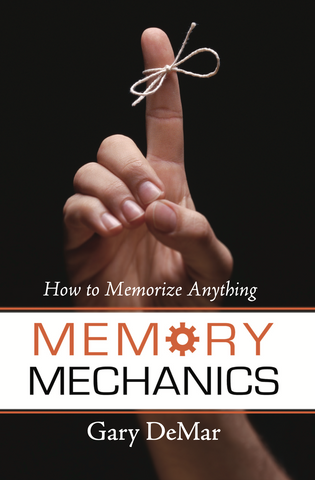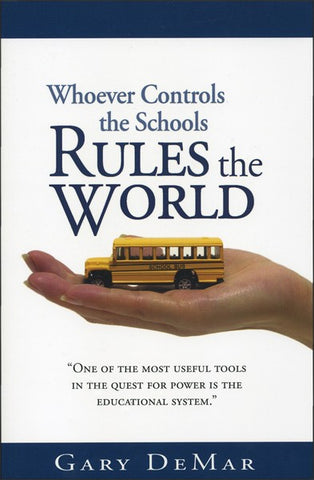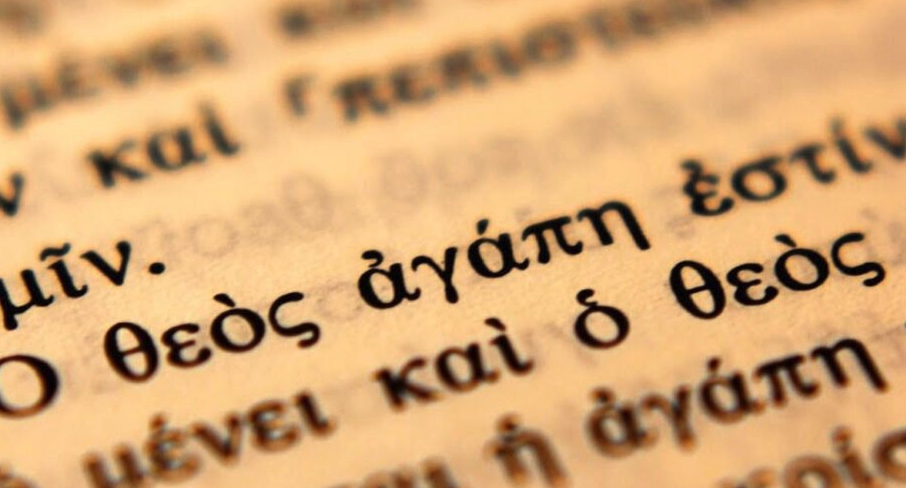Important Note: Gary DeMar’s Facebook page has been taken down. Please go to the AV Facebook page here to keep up with the latest from Gary and American Vision or continue the conversation from articles, podcasts, or videos.
My fourth-grade grandson can recite the first chapter of the Gospel of John in Latin. Very impressive. I asked his teacher when the class would recite it in Greek. She said she did not know Greek and asked if I could teach the students Greek.
Learning Greek and Latin was once part of the curriculum of the best schools. Katherine Wright, the sister of Wilbur and Orville Wright, knew Greek and taught Latin at the local public school. She later learned French.
So much of the English language consists of Greek and Latin. For example, here are some common Greek-based words: Antique, democracy, ego, idol, dialogue, geography, grammar, architect, economy, encyclopedia, telephone, television, microscope, philosophy, physical, photo, Philadelphia, philanthropy. Even Deuteronomy is made up of two Greek words.
Around 150,000 English words are derived from Greek. “It’s estimated that 29% of all English words are derived directly from Latin. If we include words from Latin-based languages like French and Italian, that figure jumps to over 60% of all English vocabulary.”

Memory Mechanics
A good memory is not just for the young. Anyone at any age can apply the system found in Memory Mechanics to improve even the most stale and forgetful memory. If you have children who struggle in school, then Memory Mechanics will change their life, and it's fun, too. You will see their self-esteem increase as they gain mastery over material that used to frustrate them.
Buy NowThere’s a great line from the My Big Fat Greek Wedding film, the very Greek Gus Portokalos often said, “Give me a word, any word, and I show you that the root of that word is Greek.” He was exaggerating, but not by much.
The day I heard my grandson’s class recite John 1:1 in Latin, I thought about how I would introduce young people to biblical Greek. I’m no Greek scholar, but I do have some knowledge of New Testament Greek, and I understand how people learn—in bits and pieces, by association, repetition, and repeating letters and words out loud. Introducing fourth graders to Greek can be an overwhelming experience if it’s not taught slowly and incrementally. Here is how I would do it.
Lesson 1
I would begin by showing them that they already know some Greek. Learning something new is best handled by associating what’s new with something already known. Have them recite their “ABCs,” and then ask them what the list of letters is called. Hopefully, they would say, “It’s the alphabet.” “Well, you just spoke Greek. You know the first two letters of the Greek alphabet. Alpha and beta, and they are written like this.”
Α α = alpha
Β β = beta
“They look like our A a and B b and sound like our A and B. By saying ‘alphabet,’ you are speaking Greek! Tomorrow we’ll learn more Greek letters similar to our English letters that will help us translate John 1:1 from Greek to English. Tell your parents that you spoke Greek today. Teach them what you learned. You learn better when you teach what you’ve learned.”
Lesson 2
“There are other Greek letters that look like our alphabet’s letters: d (δ), e (ε), i (ι), k (κ), o (ο), s (ς), t (τ), u (υ). They look and sound like our English letters, like we saw with alpha (α) and beta (β) do. Other Greek letters are easy to learn. You might celebrate Pi Day (3.14) on March 14. Pi is a Greek letter. When you get older, you’ll learn about Pi in math class. The Greek letter Π π is the ‘p’ sound.
“If you know your Bible, if I quote Revelation 22:13 where it says, ‘Jesus is the Alpha and the Omega,’ what does that mean? It means that He is the beginning (the first letter of the Greek alphabet, alpha) and the end (the last letter of the Greek Alphabet, omega (Ω, ω). Omega makes a long ō sound and is the last letter in the Greek alphabet.”
“Familiarize yourself with these letters: α (a), β (b), d (δ), e (ε), i (ι), k (κ), o (ο), s (ς), t (τ), u (υ), π (p), ω (long ō sound) so when you see the Greek letters you can sound them out and make up English words using the Greek letters. For example, βαδ and δο. Practice making words and sounding them out. If you want to learn the Greek alphabet and the names and sounds, I’ve included a chart at the end of this article.”
Lesson 3
“At this point, you know 12 of the 24 Greek letters. For our translation of John 1:1, we’ll have to learn a few more letters and some short Greek words.”
γ = g (gamma)
θ = th (theta)
λ = l (lambda)
ν = n (nun)
ρ = r (rho)
χ = ch (chi). It makes a hard c sound as in cat.
“As you can see, γ (gamma) looks something like a ‘g,’ and λ (lambda) looks like an ‘l’ sitting on a chair. With these letters, we’re getting ready to translate John 1:1 from Greek to English. Practice learning these letters. Practice recognizing these letters, pronouncing them, and sounding them out. Make English words from them. The ν (the n sound) and ρ (the r sound) are the tricky letters.”
Lesson 4
To help translate John 1:1, let’s look at some helper words related to the Greek language found in John 1:1.
Enter: Εν is translated as “in.” Remember that the Greek letter ν (nun) makes the n sound.
Archeology: ἀρχῇ is translated as “beginning, ” and λόγος means “word.” Remember that the Greek letter ρ (rho) makes the r sound.
Theology: θεὸς and θεὸν are translated “God,” and λόγος means “word.”
When you Enter a room, you go “in.” The Greek word Εν (ἐν) means “in” and is pronounced en.
Archeo-logy is an English word that’s made up of two Greek words meaning “beginning” (ἀρχῇ) and “word” (λόγος), that is, the “word” or “study” about things related to their “beginning.” Archaeologists study the beginning of human history by studying material left behind by past societies.
Theo-logy consists of two Greek words, θεὸς (theos) “God” and λόγος (logos), “word,” and means the study of God. Theologians study everything about God, religious beliefs, and the practice of religion.
Lesson 5
There are four frequently used words found in John 1:1 that we need to learn to translate John 1:1 into English.
ὁ = the article “the.” It makes the ‘ho’ sound. The use of the ‘ makes the h sound. There is no letter h in Greek. If you see a Greek word with ’, it does not make a sound.
τὸν = also the article “the” but in the accusative case. Don’t be concerned with it now. Just remember τὸν also translates as “the.”
ἦν = was. Long ā sound (ai) with the n sound: ain/ān.
καὶ = and
πρὸς = with
“With all this background, see if you can translate John 1:1 using what you’ve learned from the above Four Lessons. It’s OK to check the earlier lessons to refresh your memory. Don’t get discouraged. There was a time when you could not read English or Latin!”
John 1:1: Εν ἀρχῇ ἦν ὁ λόγος, καὶ ὁ λόγος ἦν πρὸς τὸν [‘the’] θεόν, καὶ θεὸς ἦν ὁ λόγος.
“See if you can translate John 1:2.”
John 1:2: οὗτος [this one] ἦν ἐν ἀρχῇ πρὸς τὸν θεόν
The translations of John 1:1 and 1:2.
Verese 1: Εν (in) ἀρχῇ ([the] beginning) ἦν (was) ὁ (the) λόγος (word) καὶ (and) ὁ (the) λόγος (word) ἦν (was) πρὸς (with) τὸν θεόν (God) καὶ (and) θεὸς (God) ἦν (was) ὁ (the) λόγος (word).
Verse 2: οὗτος [this one] ἦν (was) ἐν (in) ἀρχῇ (beginning) πρὸς (with) τὸν θεόν (God).
The Greek Alphabet for the Study of Biblical Greek
Upper- and Lower-Case Letters
Α α, Β β, Γ γ, Δ δ, Ε ε, Ζ ζ, Η η, Θ θ, Ι ι, Κ κ, Λ λ, Μ μ, Ν ν, Ξ ξ, Ο ο, Π π, Ρ ρ, Σ σ ς, Τ τ, Υ υ, Φ φ, Χ χ, Ψ ψ, Ω ω.


Whoever Controls the Schools Rules the World
Whoever Controls the Schools Rules the World shows how education can be used as a vehicle for social change from Karl Marx and Adolf Hitler to secular humanism and radical Islam. Our worldview opponents understand that education is where the war of ideas is fought. If Christians are serious about securing the future for our children, they must understand the nature of the war we are fighting. If you have children, want children, or know someone who has children -- you need to get this book and read it before it becomes too late to save the generation to follow us from the ruins.
Buy Now
